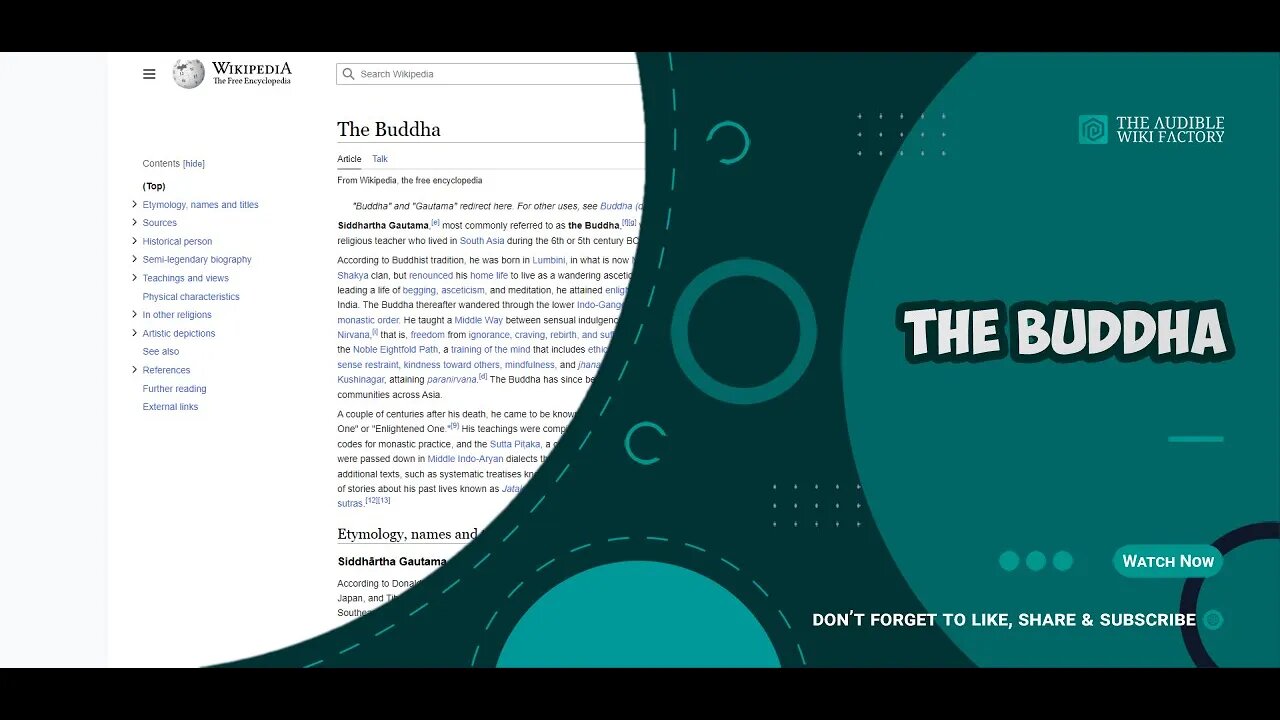Premium Only Content

Siddhartha Gautama, most commonly referred to as the Buddha, was a wandering ascetic and
Siddhartha Gautama, most commonly referred to as the Buddha, was a wandering ascetic and religious teacher who lived in South Asia during the 6th or 5th century BCE and founded Buddhism.
According to Buddhist tradition, he was born in Lumbini, in what is now Nepal, to royal parents of the Shakya clan, but renounced his home life to live as a wandering ascetic (Sanskrit: śramaṇa). After leading a life of begging, asceticism, and meditation, he attained enlightenment at Bodh Gaya in what is now India. The Buddha thereafter wandered through the lower Indo-Gangetic Plain, teaching and building a monastic order. He taught a Middle Way between sensual indulgence and severe asceticism, leading to Nirvana, that is, freedom from ignorance, craving, rebirth, and suffering. His teachings are summarized in the Noble Eightfold Path, a training of the mind that includes ethical training and meditative practices such as sense restraint, kindness toward others, mindfulness, and jhana/dhyana (meditation proper). He died in Kushinagar, attaining paranirvana. The Buddha has since been venerated by numerous religions and communities across Asia.
A couple of centuries after his death, he came to be known by the title Buddha, which means "Awakened One" or "Enlightened One." His teachings were compiled by the Buddhist community in the Vinaya, his codes for monastic practice, and the Sutta Piṭaka, a compilation of teachings based on his discourses. These were passed down in Middle Indo-Aryan dialects through an oral tradition. Later generations composed additional texts, such as systematic treatises known as Abhidharma, biographies of the Buddha, collections of stories about his past lives known as Jataka tales, and additional discourses, i.e., the Mahayana sutras.
SIDDHĀRTHA GAUTAMA AND BUDDHA SHAKYAMUNI
According to Donald Lopez Jr., "... he tended to be known as either Buddha or Sakyamuni in China, Korea, Japan, and Tibet, and as either Gotama Buddha or Samana Gotama (“the ascetic Gotama”) in Sri Lanka and Southeast Asia."
Buddha, "Awakened One" or "Enlightened One," is the masculine form of budh (बुध् ), "to wake, be awake, observe, heed, attend, learn, become aware of, to know, be conscious again," "to awaken" ""to open up" (as does a flower)," "one who has awakened from the deep sleep of ignorance and opened his consciousness to encompass all objects of knowledge." It is not a personal name, but a title for those who have attained bodhi (awakening, enlightenment). Buddhi, the power to "form and retain concepts, reason, discern, judge, comprehend, understand," is the faculty which discerns truth (satya) from falsehood.
His family name was Siddhārtha Gautama (Pali: Siddhattha Gotama). "Siddhārtha" (Sanskrit; P. Siddhattha; T. Don grub; C. Xidaduo; J. Shiddatta/Shittatta; K. Siltalta) means "He Who Achieves His Goal." The clan name of Gautama means "descendant of Gotama", "Gotama" meaning "one who has the most light," and comes from the fact that Kshatriya clans adopted the names of their house priests.
While the term "Buddha" is used in the Agamas and the Pali Canon, the oldest surviving written records of the term "Buddha" is from the middle of the 3rd century BCE, when several Edicts of Ashoka (reigned c. 269 to 232 BCE) mention the Buddha and Buddhism. Ashoka's Lumbini pillar inscription commemorates the Emperor's pilgrimage to Lumbini as the Buddha's birthplace, calling him the Buddha Shakyamuni (Brahmi script: 𑀩𑀼𑀥 𑀲𑀓𑁆𑀬𑀫𑀼𑀦𑀻 Bu-dha Sa-kya-mu-nī, "Buddha, Sage of the Shakyas").
Shakyamuni means "Sage of the Shakyas."
LINK TO ARTICLE: http://en.wikipedia.org/wiki/The_Buddha
TAGS: The Buddha, Year of death unknown, Year of birth unknown, Social philosophers, Simple living advocates, Philosophers of mind, Philosophers of love, Philosophers of ethics and morality, National heroes of Nepal, Moral philosophers, Miracle workers, Indian political philosophers, Indian ethicists, Gautama Buddha, Founders of religions, Founders of philosophical traditions, Deified people, Classical humanists, Buddhas, Avatars of Vishnu, 6th-century BC Indian philosophers, 6th-century BC Indian people, 5th-century BC philosophers, 5th century BC in religion, 5th-century BC Indian people
#GeneralKnowledge #AudibleWikiFactory #Audible #Wikipedia #TheBuddha
-
 41:13
41:13
The Audible Wiki Factory
1 year agoThe Oktoberfest is the world's largest Volksfest, featuring a beer festival and a travelling
422 -
 12:40
12:40
Chris From The 740
1 day ago $2.91 earnedIs The Walther P22 Still Trash? Let's Find Out
24.5K9 -
 1:00:37
1:00:37
Trumpet Daily
22 hours ago $7.08 earnedThe Cause of ‘Natural’ Disasters - Trumpet Daily | Jan. 10, 2025
29.6K22 -
 33:41
33:41
PMG
13 hours ago $1.11 earnedHannah Faulkner and Haile McAnally | OMAHA YR RACE
11.2K3 -
 21:24
21:24
The Based Mother
1 day ago $2.40 earnedThis is not a drill - California is set on self-destruction.
12.1K15 -
 6:06:49
6:06:49
Sgt Wilky Plays
16 hours agoFirefight Friday
77.9K6 -
 5:03:49
5:03:49
Drew Hernandez
19 hours agoLA MAYOR PUSHED $49 MILL LAFD BUDGET CUT ONE WEEK BEFORE FIRES?
128K79 -
 2:52:04
2:52:04
Nobodies Gaming
14 hours ago $6.87 earnedNobodies Rumble Gaming TEST STREAM 2.0
79.7K3 -
 1:00:36
1:00:36
Talk Nerdy 2 Us
13 hours agoDigital Surveillance, TikTok Shutdowns & The Hackers They Don’t Want You to Know About!
64.7K7 -
 3:08:37
3:08:37
SpartakusLIVE
16 hours agoDelta Force || Tactical, Strategic, HARDCORE
66K2